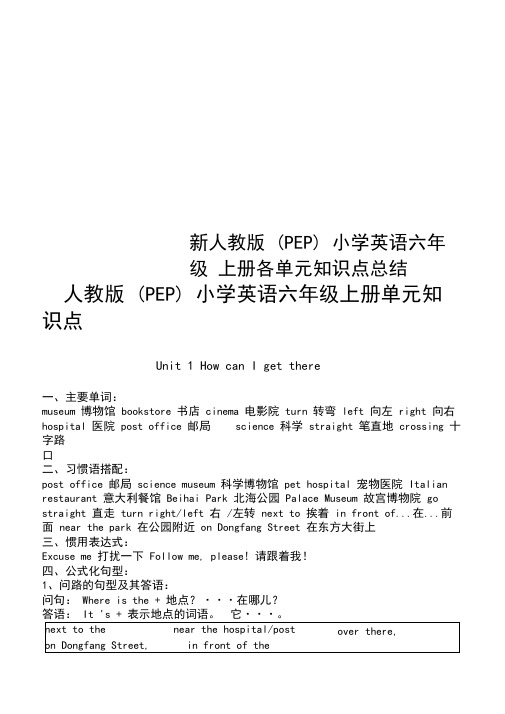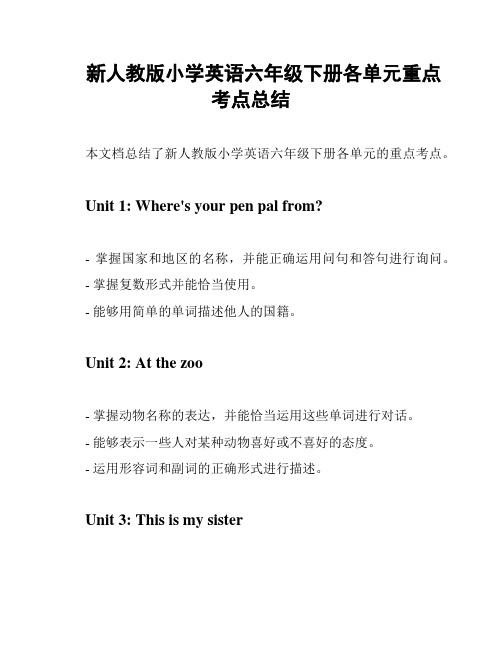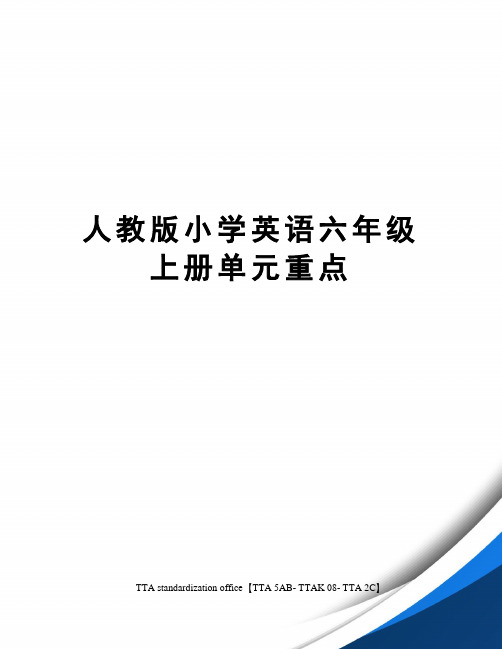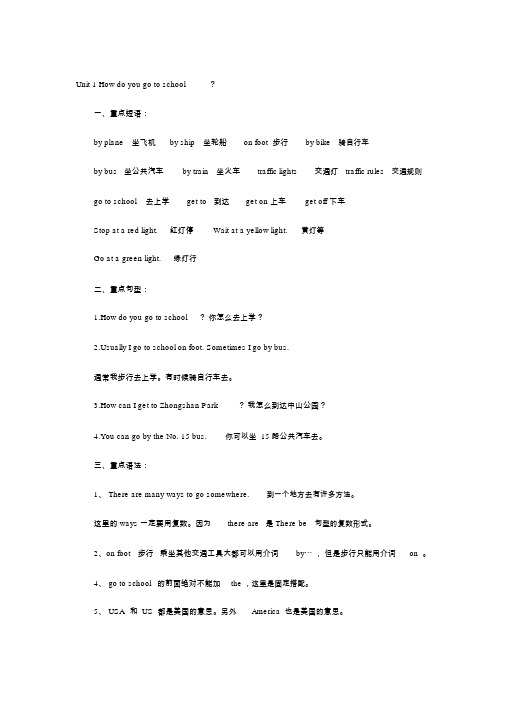小学英语六年级各个单元重点
六年级上英语重点(带英文版)

六年级上英语小单(第一单元)一.单词部分:早餐breakfast 午餐lunch 晚餐supper/dinner 走,步行walk 每一个every 上午morning/am 中午noon 下午afternoon/pm 晚上evening 经常often 容易的easy 困难的difficult 打扫,使…干净clean 窗户window 门door 地板floor 获得,收到get 烹饪,做饭cook 教teach开始begin/start 寄send 主题subject 初级的primary日常的daily 生活life 在…之后after 分钟minute 告诉tell 愿望wish 听listen 说speak 读read 写write 学习learn/study 代替instead 明天tomorrow 总是always 练习practice 一直,仍然still 完美的perfect 在里面inside 相当quite 食物food 蔬菜vegetable 猪肉pork 自己的own 在外面outside 爆米花popcorn 说唱chant二.词组部分:日常生活daily life 起床get up 在早晨in the morning 回家go home 在下午in the afternoon 在晚上in the evening 在中午at noon 吃早餐have breakfast 吃午餐have lunch吃晚餐have dinner/have supper 去上学go to school 看电视watch TV 做家务do the housework 睡觉go to bed 做早餐cook breakfast 散步take a walk 教英语teach English 读故事read stories 通过电子邮件by email 在周六on Saturdays 在周日on Sundays 看电影see a film 上钢琴课have piano lessons 弹钢琴play the piano 在家at home 擦窗户clean the window 擦门clean the door 擦地clean the floor 在八点at 8:00 在晚上七点at 7:00 in the evening 晚餐后after dinner 三十分钟30 minutes 大约在九点半at about 9:30收到你的电子邮件get your email 每天早晨every morning日日夜夜day and night 向…学习learn from三.句子部分:1.我在第六小学。
新人教版(PEP)小学英语六年级上册各单元知

新人教版 (PEP) 小学英语六年级上册各单元知识点总结人教版(PEP) 小学英语六年级上册单元知识点Unit 1 How can I get there一、主要单词:museum 博物馆bookstore 书店cinema 电影院turn 转弯left 向左right 向右hospital 医院post office 邮局science 科学straight 笔直地crossing 十字路口二、习惯语搭配:post office 邮局science museum 科学博物馆pet hospital 宠物医院Italian restaurant 意大利餐馆Beihai Park 北海公园Palace Museum 故宫博物院go straight 直走turn right/left 右/左转next to 挨着in front of...在...前面near the park 在公园附近on Dongfang Street 在东方大街上三、惯用表达式:Excuse me 打扰一下Follow me, please! 请跟着我!四、公式化句型:1、问路的句型及其答语:问句:Where is the + 地点?···在哪儿?答语:It 's + 表示地点的词语。
它···。
2、询问怎么到某地的句型及其答语:问句:How can +主语+ get (to)+地点?···怎么到···?同义句型:Can you tell me the way to + 地点?Where is + 地点?Which is the way to + 地点?答语:Turn +方向+表示地点的介词短语。
···转。
at the cinema at the corner near the post office...五、例句:Where is the cinema, please? 请问电影院在哪里?It ' s next to the hospital. 它与医院相邻。
最新北京版小学英语六年级下册单元知识总结全册

最新北京版小学英语六年级下册单元知识总结全册本文档总结了最新的北京版小学英语六年级下册的单元知识内容。
Unit 1 School life本单元主要介绍了学校生活的相关主题,如学校设施、教室用品等。
主要知识点包括:- 学校地图及地点介绍- 学校设施,如图书馆、音乐室、美术室等- 教室用品,如黑板、书包、钢笔、铅笔、课本等Unit 2 My day本单元主要介绍了日常生活中的活动及时间表达方式。
主要知识点包括:- 日常起居活动,如起床、刷牙、吃早餐等- 时间表达方式,如数字时间、时间段等- 一天不同时间的活动安排Unit 3 My family本单元主要介绍了家庭生活的相关主题,如家庭成员、家庭环境等。
主要知识点包括:- 家庭成员及称呼- 家庭环境,如家具、颜色等- 家庭活动,如吃饭、看电视等Unit 4 My city本单元主要介绍了城市生活的相关主题,如城市交通、地标建筑等。
主要知识点包括:- 城市交通工具及用途- 城市地标建筑介绍- 城市的基本特征介绍Unit 5 Food and drink本单元主要介绍了食品和饮料的相关主题,如饮食惯、食品种类等。
主要知识点包括:- 饮食惯及健康饮食知识- 食品和饮料种类介绍- 点餐和付款的相关表达方式Unit 6 Our world本单元主要介绍了地理和自然环境的相关主题,如世界各地、动物和植物等。
主要知识点包括:- 世界各地及地理位置介绍- 动物和植物种类介绍- 简单的地理和自然环境常识以上是六年级下册的各单元知识点的简要介绍,希望本文档能够帮助您更好地掌握小学英语知识。
新人教版小学英语六年级下册各单元重点考点总结

新人教版小学英语六年级下册各单元重点考点总结本文档总结了新人教版小学英语六年级下册各单元的重点考点。
Unit 1: Where's your pen pal from?- 掌握国家和地区的名称,并能正确运用问句和答句进行询问。
- 掌握复数形式并能恰当使用。
- 能够用简单的单词描述他人的国籍。
Unit 2: At the zoo- 掌握动物名称的表达,并能恰当运用这些单词进行对话。
- 能够表示一些人对某种动物喜好或不喜好的态度。
- 运用形容词和副词的正确形式进行描述。
Unit 3: This is my sister- 掌握表示家庭成员关系的词汇,并能在合适的情境下熟练使用。
- 能够用简单的句子表达自己和他人的家庭成员状况。
- 掌握疑问句和肯定/否定回答的语法结构。
Unit 4:What do you usually do on weekend?- 掌握表示日常活动和娱乐爱好的名词和动词,并能在合适的情境下熟练使用。
- 能够描述周末的计划,并能够用适当的时态表达过去、现在和未来的时间。
- 学会以礼貌的方式询问和回答他人的问题。
Unit 5: What's the matter?- 能够描述自己的身体不适,并能运用一些常用的疾病词汇。
- 掌握表示询问、建议和回答的用语,并能在合适的情境下使用。
- 学会表示关心和病愈等祝福的表达方式。
Unit 6: It's raining- 学会用简单的句子描述天气情况,并能表达对不同天气的态度。
- 掌握天气形容词的表达方式。
- 能够描述不同季节的气温、天气和风景。
总之,在学习小学英语六年级下册的过程中,应注重关注以上重点考点,并在实际中多进行运用练习,以此提高英语水平。
六年级英语单元知识点归纳

Unit 1: Greetings and Introductions- Greetings: Hello, Hi, Good morning, Good afternoon, Good evening, How are you?, Fine, thank you, How about you?, Nice to meet you- Introductions: My name is..., I am..., I'm from..., This is my friend..., This is my family, Nice to meet youUnit 2: Numbers and Colors- Numbers: Cardinal numbers (1-100), Ordinal numbers (1st - 100th), Counting by tens, Hundreds and thousands- Colors: Basic colors (red, blue, green, yellow, orange, purple, pink, black, white), Describing objects using colors Unit 3: Days, Months, and Seasons- Days of the week: Monday, Tuesday, Wednesday, Thursday, Friday, Saturday, Sunday- Months of the year: January, February, March, April, May, June, July, August, September, October, November, December - Seasons: Spring, Summer, Autumn/Fall, Winter, Weather expressions (It's sunny, It's cloudy, It's rainy, It's windy) Unit 4: School Life- Classroom objects: Desk, chair, pencil, eraser, ruler, book, bag, notebook, pen, crayon, whiteboard, blackboard- Subjects: English, Math, Science, History, Geography, Art, Music, Physical Education, Chinese- Daily routines: I wake up, I brush my teeth, I have breakfast, I go to school, I have lunch, I go home, I do my homework, I go to bedUnit 5: Family and Relationships- Family members: Mother, father, sister, brother, grandparents, aunt, uncle, cousin- Describing family relationships: My mother is my parent,My sister is older/younger than me, My uncle is my father's brother- Daily activities with family: Having meals together, Playing games, Watching movies, Helping each otherUnit 6: Food and Drinks- Food: Fruits, vegetables, meat, fish, rice, noodles, bread, pasta, eggs, milk, cheese- Drinks: Water, juice, soda, tea, coffee, milkshake- Expressing likes and dislikes: I like..., I don't like..., I love..., I hate..., I enjoy...Unit 7: Clothes and Weather- Clothes: T-shirt, jeans, skirt, dress, sweater, jacket, hat, shoes, socks, gloves, scarf, boots- Weather: Hot, cold, warm, cool, sunny, rainy, cloudy, windy, snowy- Choosing appropriate clothing according to the weatherUnit 8: Daily Activities and Time- Daily activities: Getting up, getting dressed, having breakfast, going to school, studying, playing, doing homework, having dinnerUnit 9: Travel and Transportation- Modes of transportation: Car, bus, train, bicycle, motorcycle, taxi, airplane, subway, boat, ship- Travel vocabulary: Ticket, passport, luggage, suitcase, boarding pass, departure, arrival, customs, immigration - Talking about travel experiences and destinationsUnit 10: Hobbies and Leisure- Hobbies: Reading, drawing, painting, playing musical instruments, playing sports, gardening, cooking, dancing, singing- Leisure activities: Watching movies, going to the park, hanging out with friends, shopping, playing video games, surfing the internet。
(完整版)人教版小学英语6年级重点知识

六年级上册知识点reporter act —actor act —actress art —artistengine —engineerUnit 1 How do you go there?主要单词: by plane 坐飞机 by ship 坐轮船 on foot 步行 by bike 骑自行车 by bus 坐公共汽车 by train 坐火 车 traffic lights 交通灯 traffic rules 交通规则 Stop at a red light 红灯停 Wait at a yellow light 黄灯等 Go at a green light 绿灯行主要句子: How do you go to school? 你怎么去上学? Usually I go to school on foot. Sometimes I go by bus. 通常我步行去上 学。
有时候骑自行车去。
How can I get to Zhongshan Park ? 我怎么到达中山公园? You can go by the No. 15 bus. 你可以坐 15 路公共汽车去。
Unit 2 Where s the science museum?主要单词: library 图书馆 post office 邮局 hospital 医院 cinema 电影院 bookstore 书店 science museum 科学 博物馆 turn left 向左转 turn right 向右转 go straight 直行 north 北 south 南 east 东 west 西 主要句子: Where is the cinema, please? 请问电影院在哪里? It 's next to the hospital. 它与医院相邻。
Turn left at the cinema, then go straight. It ' s on the 在电影院向左转,然后直行。
人教版小学英语六年级上册单元重点

人教版小学英语六年级上册单元重点TTA standardization office【TTA 5AB- TTAK 08- TTA 2C】六年级上册1-3单元知识点Unit1 How Do You Go There (你怎样去那里)重点单词:on foot= walk走路 by bike骑自行车 by bus坐公车 by train坐火车 by plane坐飞机by ship坐轮船 by subway坐地铁 near近的 far远的 usually通常 sometimes有时候easy简单的 the fifth floor第五层楼 traffic lights交通灯 traffic rules交通规则 stop停止 wait等待 get to到达 same相同的 mean意思是 driver司机 right右边 left左边must必须 know知道重点句子:1. How do you go to school 你是怎样去上学的2. I go to school by bus.我是坐公交车去上学的。
3. Usually I go to school on foot. 我通常走路去上学。
4. Sometimes I go by bike. 有时候我骑自行车去。
、5. My home is near/ far. 我的家是近的。
/ 远的。
6. Look at the traffic lights, remember the traffic rules. 看着交通灯,记住交通规则。
7. Stop at a red light. Wait at a yellow light. Go at a green light. 红灯停。
黄灯等一等。
绿灯行。
8. Red means stop, yellow means wait, green means go. 红色的意思是停止,黄色的意思是等待,绿色的意思是通行。
9. How can I get to the park 我该怎样到达公园呢10. You can go by the No. 15 bus. 你可以坐15路公交车去。
小学六年级英语上册各单元知识点汇总(人教版)

Unit 1 How do you go to school?一、重点短语:by plane坐飞机by ship坐轮船on foot 步行by bike骑自行车by bus坐公共汽车by train坐火车traffic lights交通灯traffic rules交通规则go to school去上学get to到达get on 上车get off 下车Stop at a red light.红灯停Wait at a yellow light.黄灯等Go at a green light.绿灯行二、重点句型:1.How do you go to school?你怎么去上学?ually I go to school on foot. Sometimes I go by bus.通常我步行去上学。
有时候骑自行车去。
3.How can I get to Zhongshan Park?我怎么到达中山公园?4.You can go by the No. 15 bus.你可以坐15路公共汽车去。
三、重点语法:1、 There are many ways to go somewhere.到一个地方去有许多方法。
这里的 ways 一定要用复数。
因为there are是There be句型的复数形式。
2、on foot步行乘坐其他交通工具大都可以用介词by⋯,但是步行只能用介词on 。
4、 go to school的前面绝对不能加the ,这里是固定搭配。
5、 USA和US都是美国的意思。
另外America 也是美国的意思。
6、go to the park前面一定要加the. 如果要去的地方有具体的名字,就不能再加the ,如果要去的地方没有具体名字,都要在前面加the. ( go to school除外。
)7、How do you go to⋯?你怎样到达某个地方?如果要问的是第三人称单数,则要用:How does he/she⋯go to⋯?8、反义词:get on (上车) ---get off (下车)near (近的)—far (远的)fast(快的)— slow (慢的)because (因为)—why (为什么)same (相同的)—different (不同的)9、近义词:see you---goodbye sure---certainly---of course10、频度副词:always总是,一直usually通常often 经常sometimes有时候never从来不Unit 2 Where is the science museum?一、重点短语:library图书馆post office邮局hospital 医院cinema电影院bookstore书店science museum科学博物馆turn left 向左转turn right向右转go straight直行north 北south 南east 东west 西next to 靠近、与⋯⋯。
- 1、下载文档前请自行甄别文档内容的完整性,平台不提供额外的编辑、内容补充、找答案等附加服务。
- 2、"仅部分预览"的文档,不可在线预览部分如存在完整性等问题,可反馈申请退款(可完整预览的文档不适用该条件!)。
- 3、如文档侵犯您的权益,请联系客服反馈,我们会尽快为您处理(人工客服工作时间:9:00-18:30)。
Unit2一、单词四会单词:beautiful 美丽的adj. dollar 美元n.where到处adv. forget 忘记v.test 测试 n. shop 商店 n. sell 出卖 v.potato 马铃薯n. necklace 项链 n. ring 戒指 n.三会单词:always 总是 adv. mascot 吉祥物 n. shell 贝壳n.二、词组1.be full of 充满着eg.: My room is full of mascots.2.lots of =a lot of 许多eg.: I have a lot of silverbells.3.at school 在学校 eg.: When there is a test at school?4.be back 回来 eg.: I’ll be back in a minute.5.in a minute 一会eg.: I’ll be back in a minute.6.a bag of 一袋子eg.: A bag of potatoes, please.7.have a look 看一看eg.: Let me have a look.8.watch out 小心eg.: Watch out!三、句型(1)重点句型:1.There be 句型,表示某处有某物,表示空间上的拥有。
There is+单数+(地点)There are+复数+(地点)eg.: There is a test at school.There are two mascots in my wardrobe.2.have got/has got 一般表示生命的拥有eg.: She has got a skateboard.Toby has got a nice face.I have got a book.(2)非重点句型:1.give sb.sth. 把某物给某人eg.: I can give you one hundred silver dollars.2.want to do sth.想要做某事eg.: I want to sell the necklace.3.show sb.sth. 把某物展示给某人eg.: Can you show me your mascot?四、语法1.祈使句:表示请求.命令.叮嘱.邀请.劝告等。
通常无主语,以动词开头。
e.g.: Watch out!祈使句的否定形式,通常在句子前加don'te.g.: Don't watch out!2.1 have got/has got 的用法。
have got=have / has got=has (二者只有在表达有的意思时可以替换) 其中have got 用于第一人称单数复数和第二人称单数复数中,has got用于第三人称单数中。
eg.: I/You/we/They have got It/she/he/单个人名 has gotUnit3一、单词三会单词:pony 小马n. castle 城堡 n. spaceman 太空人n.suddenly 突然地adv. prince 王子n. dust 灰尘n.四会单词:key钥匙n. lock 锁n. never从不adv.monster 怪物n. never从不adv. often 有时 adv.pond 池塘n. sometimes 有时adv. who 谁 adv.二、词组1.fast asleep 熟睡 eg.: You’re fast asleep.2.wake up 醒来 eg.: Suddenly you wake up.3.jump out of 跳出来 eg.:You jump out of the bed.4.look for 寻找 eg.: The monster looks for you.5.get back into 回到… eg.: You close the window and getback into bed.6.dream of ….梦到… eg.: Toby often dreams of a dog.7.look like 看上去像… eg.: It looks like a castle.8.over there 在那边 eg.: There’s a path over there.9.just a minute 等一下 eg.: Just a minute, Prince.e back 回来11.right now 立即马上12.have sports 做运动13.from…to…从…到… eg.: Do homework from seven to eight.14.go to school 去上学15.go to bed 去睡觉三.句型1.dream of +n./doingeg.:I often dream of being a football star.2.dream + thateg.: I often dream that I can fly.3.get sb. sth. 给某人带来某物eg.: Get me a sandwich and some orange juice4.Let's +动词原型让我们….eg.:Let's go in.5.looks like 看起来像….eg.: It looks like a castle.四.语法1.人称代词:表示所有关系的代词叫物主代词,物主代词分为形容词性物主代词和名词性物主代词两种。
物主代词有人称和数的变化。
这三种代词的形式如下:2.介词on/ at /in 在时间.星期和月份中的用法。
at+具体时间 on+星期(具体某一天) in+月份,年eg.: I get up at seven.I learn English on Sunday.My birthday is in June.3.in the morning 在早上 in the evening 在晚上in the afternoon 在下午一、单词四会单词:sticker 贴画 n. comics 连环画n. stamp邮票n.postcard 明信片n. autographs 签名n.三会单词:wonderful 棒的adj. cactus 仙人掌n.二、词组1.football pictures 足球画eg.: She doesn't collect football pictures.2.be gone 消失了eg.: My black hat is gone.三.句型1.There be 句型,be动词的选择采用就近原则eg.: There are elephants and dogs.There is a tiger and a fox.2.give sb.sth. 把某物给某物eg.: Give me the hundred dollars first.3.stop doing sth.停止做某事eg.: Stop crying.4. How many do you have? 你有多少?5. How much is it? 多少钱?四、语法一般现在时的用法表示现在经常性习惯性的动作结构:1.第一人称/第二人称以及复数形式+动词原型eg.: I/We/You/They collect…..2.第三人称单数+动词第三人称单数 eg.: he/she collects一、单词四会单词:athlete 运动员 n. cyclist骑自行车的人n.swimming 游泳n. train 火车 n. famous 著名的 adj.send 送寄v. kilometer 公里 n.二、词组1.in a minute 在一分钟内eg.: How often can you jump in a minute?2.bend your knees 屈膝eg.: How often can you bend your knees in a minute?三、句型1.What's the time? 现在几点了?2.It's eight o'clock.八点It's half past nine.九点半It's aquarter to nine. 差一刻钟九点3.I think the correct answer is B.我认为正确的答案是B.I don't think so.我认为不是这样。
4.In one minute, a top athlete can run about 400 meters.一个顶级运动员在一分钟内大约跑400米。
三、语法1.how often 提问频率 eg.: How often can you jump in a minute?2.How many+可数名词复数提问数量 eg.: How many animals can youdraw?3.What about…询问…怎么样? What about doing sth.?eg.: What about number one? What about playing football?Unit6一、单词四会单词: across 穿过v. build 建造 v. bear熊n. bird鸟n.cold 寒冷adj. dark黑暗adj. daytime白天n. grandma奶奶外婆n. grandpa爷爷外公n.三会单词:also 也adv. hare野兔n. Arctic 北极n. hill小山hunt 打猎v. lake 湖n. life 生命n.二、词组1.over there 在那边 eg.: What's over there?2.in the water 在水里 eg.: He jumps in the water.3.across the lake 游过湖 eg.: He swims across the lake.4.run up 跳上 eg.: He runs up the hill.5.look around 环顾四周 eg.: He looks around.6.in the daytime 在白天 eg.: Snowy owls hunt in the daytime.7.go fishing 去钓鱼 eg.: Can we go fishing again tomorrow?8.next year 明年 eg.: Can I come again next year?三、句型1.want to do sth. 想要做某事eg.: He wants to catch a hare.2. show sb. sth. 把某物展示给某人看eg.: I'll show you my TV.3.There are no +复数没有….eg.: There are no shopping malls.4.There is no +单数名词没有…eg.: There is no TV.5 .What can I do? 我们能做什么?6.Can I +动词原型我能…..eg.: Can I come again next year?7.How big+…? …多大?eg.: How big are polar bears?四、语法1.be going to do sth. 打算计划做某事We/You/They are going to do sth.I am going to do sth.He/She is going to do sth.2.一般将来时,表示将来要发生的事情。
